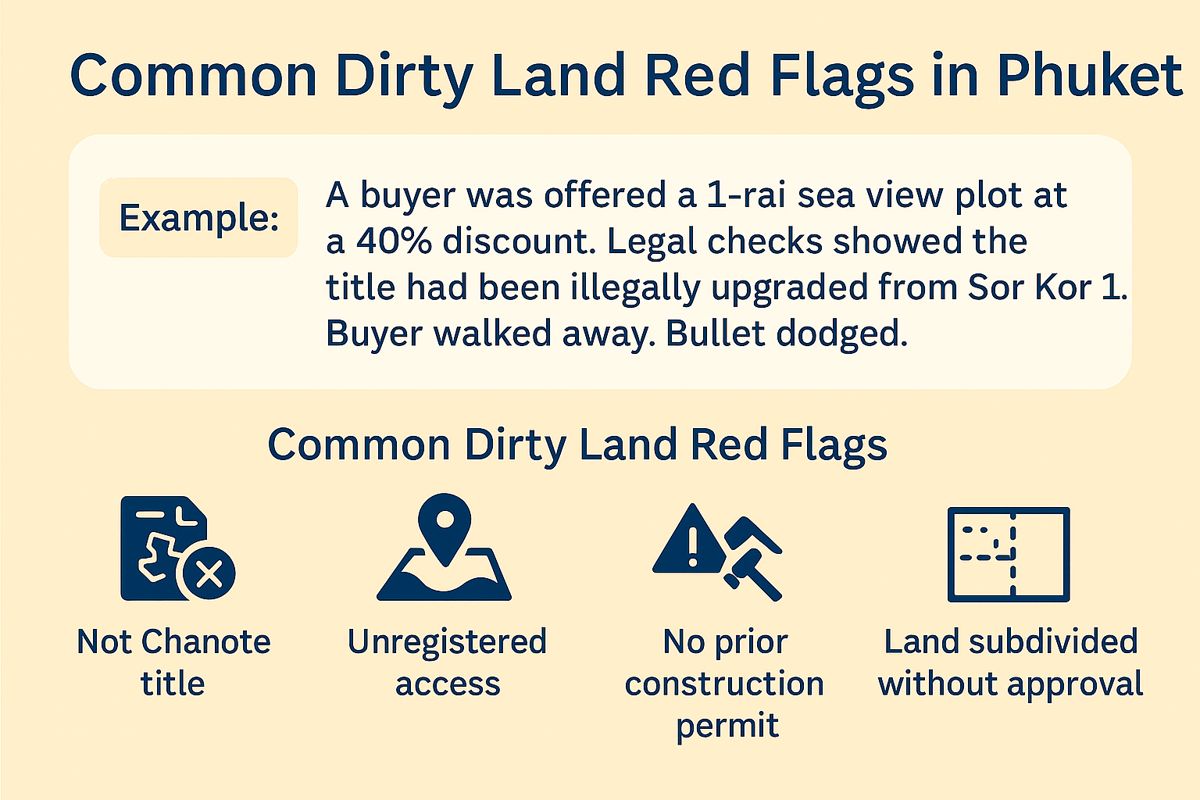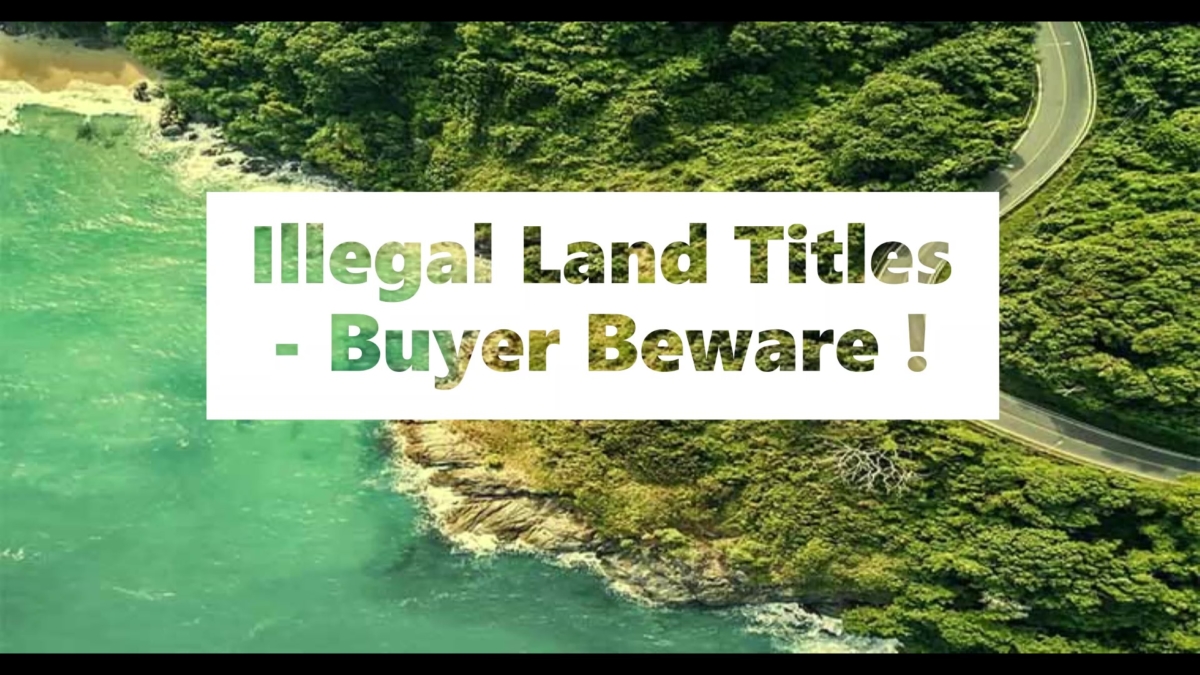Phuket illegal land titles are one of the biggest risks foreigners face when considering property on the island. “Dirty land” refers to land without proper documentation, or with forged, upgraded, or illegally issued titles. This guide explains what counts as an illegal land title, the most common scams, the risks involved, and how you can protect yourself with proper due diligence.
What Are Phuket Illegal Land Titles?
Illegal land titles in Phuket usually involve property that:
-
Lacks genuine registration at the Land Office.
-
Was carved out of forest reserves or public land.
-
Is misrepresented as having upgrade potential when no upgrade is legally possible.
-
Uses forged or altered documents.
In short, if the land does not have a legitimate, verifiable title deed issued by the Land Department, it is considered “dirty land” and is unsafe to buy.
Types of Land Titles in Thailand
Understanding land title documents is essential to avoid scams:
-
Chanote (Nor Sor 4 Jor): The most secure title, fully surveyed and GPS plotted. Safest for buyers.
-
Nor Sor 3 / Nor Sor 3 Gor: Recognised but less precise, can sometimes be upgraded to Chanote.
-
Sor Kor 1: A claim certificate only, not a full title deed. Risky.
-
Por Bor Tor 5: Tax receipts for land use, not ownership rights.
-
Forest or agricultural land papers: Not transferable to foreigners, often misrepresented.
Only Chanote, Nor Sor 3, and Nor Sor 3 Gor are generally safe for foreigners to lease or purchase through a company or Thai spouse structure. For official information on land ownership documents, visit the Department of Lands, Thailand.
Common Land Scams in Phuket
Buyers should be aware of the most frequent scams involving Phuket illegal land titles:
-
Forged titles: Fake or altered documents presented as genuine.
-
Misrepresentation: Agricultural or forest land marketed as residential or “soon to be upgraded.”
-
Duplicate sales: Land sold by someone other than the rightful owner.
-
Overlapping boundaries: Titles issued without proper surveys, leading to disputes.
These scams are not only illegal but can also result in the complete loss of your investment.
Phuket Illegal Land Titles: Why Legal Due Diligence Is Essential
Before any commitment on land in Phuket, comprehensive due diligence by an independent, qualified lawyer is critical. This should include:
- Chain of title history: Trace the document trail all the way back to Sor Kor 1 (if applicable) and confirm each subsequent upgrade (e.g., Sor Kor 1 → Nor Sor 3 → Nor Sor 3 Gor → Chanote) was lawfully issued and recorded at the Land Office. This matters in Phuket because forged Sor Kor 1 claims were historically used to obtain Chanote on protected or public land, leading to revocations and court actions.
- Verification at the Land Office: Cross-check the title deed, survey maps, and any encumbrances directly with the Land Department’s records. (Remember Sor Kor 1 is a possession notice, not ownership, so upgrades must be legitimate and provable.)
- Access rights & servitudes: Confirm road access and any registered easements are valid and usable.
- Zoning & permitted use: Ensure the plot complies with local zoning, environmental and building rules.
- Protected land screens: Cross-check against national park, forest reserve, and EIA maps to ensure the plot is not encroaching on restricted areas (a common vector in past Phuket cases).
- Seller/developer capacity: Verify the seller’s legal right to transfer, including corporate authority if a company is involved.
For official resources and background, see the Department of Lands, Thailand
Legal and Financial Risks
Purchasing land under an illegal title in Phuket comes with severe consequences:
-
You gain no legal ownership rights.
-
The government can repossess or demolish structures built on illegal land.
-
Courts consistently rule against buyers holding fraudulent or non-transferable titles.
-
There is no compensation when illegal ownership is revoked.
- In short, you could lose both the land and any buildings constructed on it.

How to Protect Yourself
Foreigners can avoid the dangers of Phuket illegal land titles by following some key steps:
- Verify at the Land Office: Always cross-check the title deed and survey records.
-
Hire a qualified lawyer: Legal professionals can confirm title authenticity and boundaries.
-
Conduct due diligence: Ensure the land is properly zoned and not under dispute.
-
Be cautious of “too good to be true” deals: Unrealistically cheap plots are often linked to illegal titles.
For further details, see our Guide: Land Titles.
Related Guides
Phuket Illegal Land Titles: Conclusion
Phuket illegal land titles remain a major risk. With proper due diligence, expert legal advice, and careful checks, buyers can avoid scams and protect themselves.
Disclaimer: The information contained in this article is provided for general informational purposes only and does not constitute legal, financial, or investment advice. While every effort has been made to ensure accuracy at the time of publication, property laws and regulations in Thailand are subject to change. Readers should always seek independent legal advice from a qualified Thai lawyer before making any property-related decision or transaction.


Social Contact